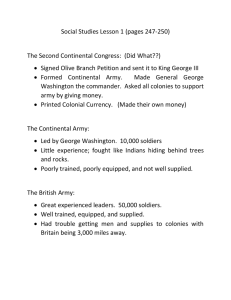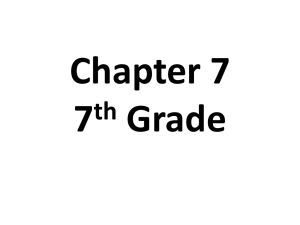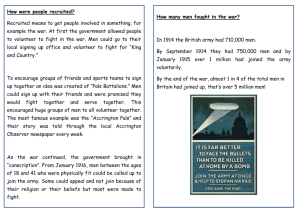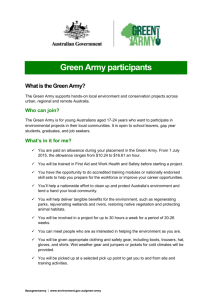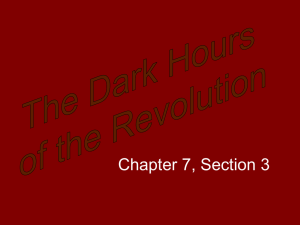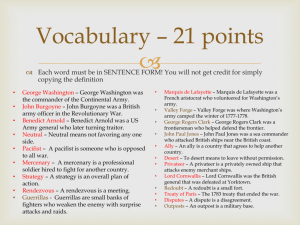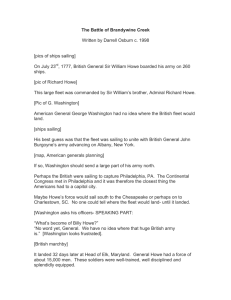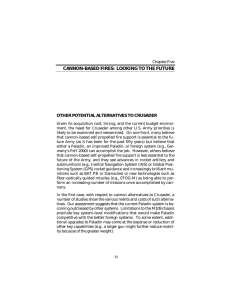SS webnotes chapter 12
advertisement
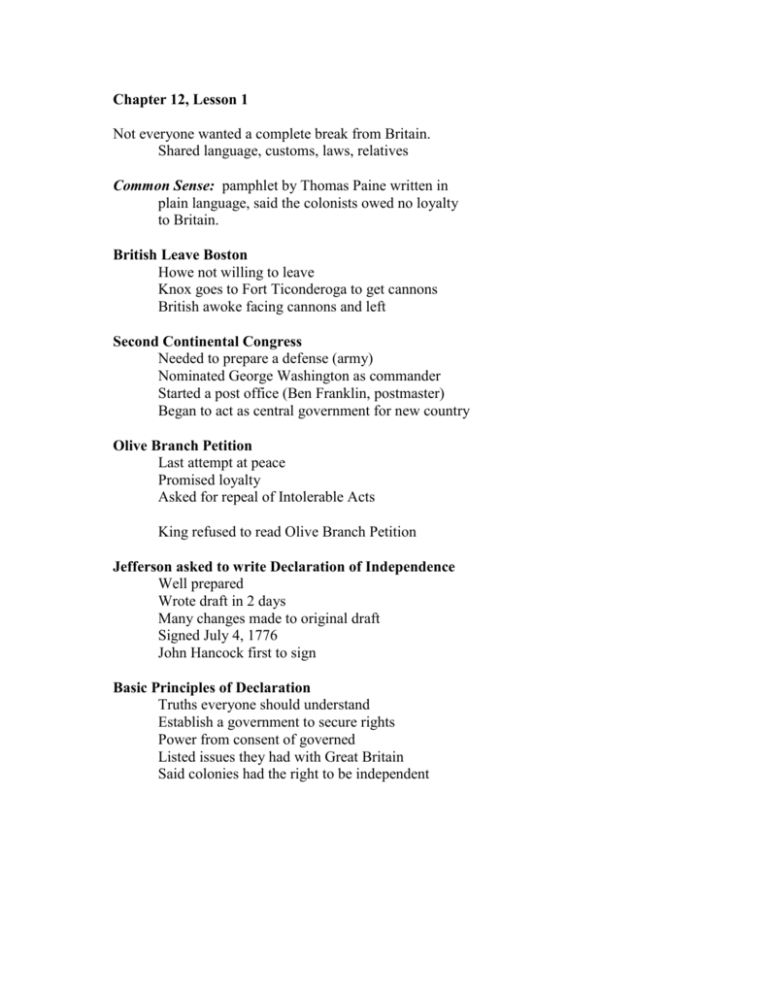
Chapter 12, Lesson 1 Not everyone wanted a complete break from Britain. Shared language, customs, laws, relatives Common Sense: pamphlet by Thomas Paine written in plain language, said the colonists owed no loyalty to Britain. British Leave Boston Howe not willing to leave Knox goes to Fort Ticonderoga to get cannons British awoke facing cannons and left Second Continental Congress Needed to prepare a defense (army) Nominated George Washington as commander Started a post office (Ben Franklin, postmaster) Began to act as central government for new country Olive Branch Petition Last attempt at peace Promised loyalty Asked for repeal of Intolerable Acts King refused to read Olive Branch Petition Jefferson asked to write Declaration of Independence Well prepared Wrote draft in 2 days Many changes made to original draft Signed July 4, 1776 John Hancock first to sign Basic Principles of Declaration Truths everyone should understand Establish a government to secure rights Power from consent of governed Listed issues they had with Great Britain Said colonies had the right to be independent Chapter 12, Lesson 2 British brought in German mercenaries to fight for them. Colonial soldiers were poorly equipped. British Strengths Strong navy Well-trained army Well-supplied army Mercenaries British Weaknesses foreign land expensive transport lacking support Colonial Strengths Home territory Familiar with land Strong leadership Colonial Weakness poorly trained army poorly supplied army 1/3 = people still loyal to Britain 1/3 = Patriots supported independence 1/3 = neutral (Quakers who oppose war) George Washington Good at math, but no college Surveyor Wanted military career Elected to House of Burgesses Married Martha Custis, lived at Mount Vernon Victory at Trenton Crossed the Delaware Surprise attack after nightfall on Christmas 1776 Army feared Africans would rebel if they were allowed to have guns in army. Eventually they were allowed to join. Some states began thinking about abolish slavery Battle of Saratoga British General John Burgoyne thought he would take over the Hudson River Valley to cut off New England and New York, but the Americans were able to stop him. He was outnumbered and surrendered. Winter at Valley Forge Howe had captured Philadelphia Continental Congress fled to York, PA Army set up at Valley Forge 2,500 died of disease no shoes for some trained by von Steuben Chapter 12, Lesson 3 People thought the war would end quickly. It took 8 years for a peace treaty to be signed. George Rogers Clark From Kentucky Wanted Britain out of Ohio Riv. Val. Attacked yelling & screaming Britain surrenders “Washington of the West” John Paul Jones Naval hero Ship was falling apart from attack When asked if he would give up…said he had just begun to fight. Ended up forcing British ship to surrender Benedict Arnold Once a patriot commander Married a loyalist Put in charge of West Point Planned to tell British about our defense Americans found out Arnold escaped and became a British soldier Traitor Mary Ludwig Hays=Molly Pitcher Loaded cannons Fought when husband injured Deborah Sampson Disguised as man to fight Dicey Langston 16, brought news of enemy across the river Haym Salomon Spied for patriots Raised $ for army Died penniless Francis Marion “Swamp Fox” quick attacks, then back to the swamp Nathaniel Greene “We fight, we get beat, rise, and fight again.” British won most battles in the south, but continued to lose men. Retreated to the North. Yorktown Last stand for the British troops James Armistead was spying for the Patriots and deceived Cornwallis British surrender October 19, 1781 King George wants to continue, but his government said no. Treaty of Paris of 1783 gave United States independence at last. Many loyalists left for good Iroquois Confederacy moved north to Canada
